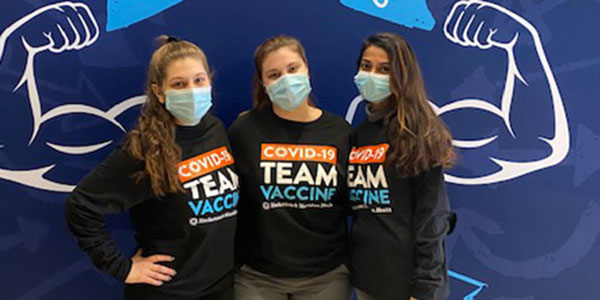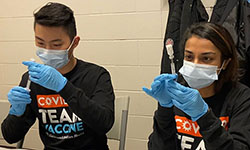Pharmacy students administer COVID-19 vaccine
Student volunteers help fill a critical role putting shots in arms

Pharmacists have been on the frontlines throughout the pandemic, and counted among them are about 125 Binghamton University School of Pharmacy and Pharmaceutical Sciences students who are continuing to assist with COVID-19 testing and are now also administering the vaccine.
Many of the students are vaccinating eligible people as part of their jobs, but about 40 of them are volunteering, often driving for hours or fighting traffic as they commute to vaccination sites. Why are they doing it? To be part of history, they say.
Take Mahvish Hoda, for example. A third-year student (P3), she put shots in arms at a Medicine Shoppe in her hometown of Binghamton, then drove to New Jersey’s MetLife Stadium where she is volunteering for the Hackensack Meridian Hospital mega vaccination site. When she’s done there, she’ll return to Binghamton and assist where she works at Lourdes Hospital.
At The Medicine Shoppe, Hoda did it all. “I was getting everyone registered. We were giving it to those 65 and older, so I would take their photo ID and get them set up with the consent form, give them a record card, walk them through the possible side effects and answer their questions,” she said. “Then I would give them the shot and observe them for 15 minutes.”
No one she vaccinated had issues during the monitoring period, she added. “It’s great to be on the frontline and hopefully helping to put the pandemic to an end.”
At the MetLife Stadium mega site, Hoda is joining with several other Binghamton student volunteers who have traveled from Long Island, Rockland County and other parts of downstate New York. Among them are P3 students Marisa Ferber and Laraib Khan.
After her rush-hour drive, which would take 45 minutes without traffic, Ferber started her service with an orientation. “That’s where it was described how to talk to the patients and explain the type of vaccine – that it’s not a regular flu vaccine – and we learned about the storage requirements,” Ferber said. “Each station had a National Guard soldier who took all of the patient information and I would give the vaccine.”
Ferber, who is interested in working in emergency medicine or the military after earning her PharmD, is encouraging her fellow students to administer vaccinations at The Medicine Shoppe in Binghamton as well.
Khan said volunteering at the clinic was a fun experience. “Shifts vary from five to seven hours and I’m doing the morning shift,” she said. “I love vaccinating people. Since my P2 (second year), I’ve done a lot of flu clinics and this site is really organized.
“I feel like it’s a very surreal moment doing this because a lot of people are so happy to be there and be part of history, part of this moment,” Khan added. “When I’m older, I can tell my family I administered the COVID vaccine. I can get clinical hours anywhere, but I want to be part of this.”
Some of the patients question how young the student vaccinators are, but once they answer all of the patients’ questions, it’s apparent to the patients the students know what they’re doing. In fact, they all receive certification in delivering immunizations in their first year and annually staff flu clinics after that.
“One lady thought I was so young,” said Khan. “They have questions like about being immunosuppressed. I explained to one daughter that her mother’s thyroid issues would not put her at risk. I get to counsel patients and there’s a doctor and pharmacists walking around. There’s a lot of help there.”
For the students, administering the vaccine at such a critical time has also helped them understand what kind of pharmacy career they may pursue.
For Khan, who shadowed in a hospital setting last year and saw how all of the healthcare providers listened to the pharmacist, the healthcare team is important. “I want to work with nurses and doctors in a critical care, high-adrenaline environment and have them come to me to counsel on drugs. Being a critical care pharmacist would do that for me.”
Ferber is thinking about emergency medicine where she will have “as much patient interaction as possible.”
“I’m seeing how big an impact we have and how much the world needs pharmacists,” she said.


